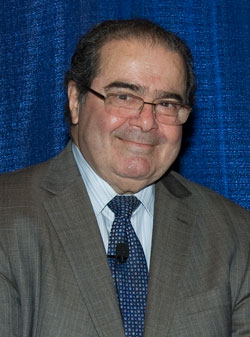'Taking what?' Scalia objection could mean loss for developer objecting to government 'shakedown'

Photo of U.S. Supreme Court Justice Antonin
Scalia courtesy of ABA Media Services.
The government appeared to have the upper hand when a property-rights lawyer argued before the U.S. Supreme Court on Tuesday that monetary conditions on the development of Florida land amounted to an unconstitutional taking.
The Pacific Legal Foundation, representing a would-be developer, sought to expand Supreme Court precedent restricting excessive government demands for property in exchange for building permits. PLF lawyer Paul Beard II argued the precedent also applies when the government requires a developer to spend money. “The Constitution prohibits government shakedowns against property owners who are seeking permits to use their land, and that prohibition doesn’t come with an asterisk,” Beard said in a statement after the arguments.
Beard’s case met with some resistance, according to an assessment by SCOTUSblog. “Something really big, and potentially decisive, happened to a major new property rights case between the time the Supreme Court took it on, and Tuesday’s argument by lawyers before the court,” SCOTUSblog said. “The very idea that an unconstitutional ‘taking’ had occurred to an owner of a small plot of ground in Florida seemed near to vanishing, propelled toward oblivion by a spreading fear on the bench that maybe the entire regulatory apparatus of government might be at risk. Credit lawyers for a state agency and the federal government for deepening this anxiety.”
The Wall Street Journal Law Blog (sub. req.) and the Christian Science Monitor have background on the case. Developer Coy Koontz Sr. wanted to develop about four acres of a nearly 15-acre plot in Florida’s Orange County, and agreed to dedicate the rest of his property to conservation in exchange for the privilege. But a wetlands management district said he would also need to make improvements to 50 acres of government-owned property located miles away from the project. Other options were also offered.
The Florida Supreme Court had held there was no taking when a condition is spending money, according to the Christian Science Monitor account. The state supreme court also said there no taking because the permit was denied and nothing was taken from Koontz. (Koontz’s son Coy Koontz Jr. continued the case after his father’s death.)
Koontz likely needed the vote of Justice Antonin Scalia, who had written one of the two takings precedents cited in the case, SCOTUSblog says. But Scalia “strenuously assailed” the takings claim, the blog says, questioning whether there had been a taking because the permit was denied. In response to an argument about the taking by Koontz’s lawyer, Scalia said, “Taking what?” He continued to use the phrase, with some variations, throughout the oral argument.
The case is Koontz v. St. John River Water Management District.



